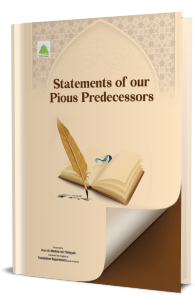
Remembering our Pious Elders
Abu Majid Muhammad Shahid Attari Madani
Ṣafar is the second month of the Islamic year. Regarding the Companions, saints, and scholars who passed away or are commemorated in this month, 81 have been previously mentioned in Faizan-e-Madinah Monthly Magazine (1439 AH -1444 editions). A further 12 are mentioned herein.
The Companions رَضِیَ الـلّٰـهُ عَنْهُم
1. Abū Laylā Awsā Ansārī رَضِىَ اللّٰهُ عَـنْهُ took part in every ghazwa besides the Battle of Badr. He later moved to Kufa, and he fought alongside ꜤAlī b. Abī Ṭālib رَضِىَ اللّٰهُ عَـنْهُ in every battle. He was martyred during the Battle of Ṣiffīn (37 AH).[1]
2. Hashim b. ʿUtba Qurashī Zuhrī رَضِىَ اللّٰهُ عَـنْهُ was Sʿad b. Abī Waqqāṣ’s nephew. He accepted Islam on the day Mecca was conquered and fought notably during many battles, especially those of Yarmuk, Qadisiyyah, and Jalula. Hailing from the courageous noblemen of the Quraysh, he was the flag bearer of Mawla ꜤAlī’s army during the Battle of Ṣiffīn, in which he was martyred.[2]
Saints رَحِمَهُمُ الـلّٰـهُ
3. Founder of Lucknow’s Mīnāˈiyya khanqa, Niẓām al-Dīn Muhammad Chishtī رَحْمَةُ الـلّٰـهِ عَـلَيْه was a descendant of Abū Bakr al-Ṣiddīq. Born into a Sufi household, he passed away on the 23rd of Ṣafar 884 AH and was also known as Makhdūm Shāh Mīnā. He was a lifelong saint, master of many sciences, an ascetic, the quṭb of his era, a famous shaykh of the Chishtiyya Niẓāmiyyah order, skilled in spirituality and Islamic law, and a source of guidance for scholars and the public.[3]
4. Maḥmūd Chishtī Gujarātī رَحْمَةُ الـلّٰـهِ عَـلَيْه was born into a Sufi family. He was a murid and successor of his father, who was a shaykh of the Chishtiyya Niẓāmiyyah order. Gujarat’s inhabitants benefitted from him immensely. He passed away on the 22nd of Safar 900 AH and his grave is in Anawara (Gujarat; India).[4]
5. ʿAbd al-Razzāq Ḥamawī Gīlānī رَحْمَةُ الـلّٰـهِ عَـلَيْه was born in Hama, Syria. Hailing from the lineage of Shaykh ꜤAbd al-Qādir al-Jīlānī رَحْمَةُ الـلّٰـهِ عَـلَيْه, he was a shaykh in the Qādiriyya spiritual order and loved by all. He travelled to Aleppo, Damascus, and Tripoli often. He passed away on the 6th of Ṣafar 901 AH and is buried next to his grandfather (in Bab al-Nāʿūra; Hama). [5]
6. Muhammad Isˈḥāq Qādirī رَحْمَةُ الـلّٰـهِ عَـلَيْه was born to a Sufi household in Pakhari, India. He passed away on the 10th of Ṣafar 1010 AH in Miana Gondal (Gujarat; Pakistan). He was a shaykh of the Qādirīyya order, an ascetic, and his dua was known to be accepted.[6]
7. Lovingly known as Bābā Bulhē Shāh, Sayyid Muhammad ʿAbdullah Jīlānī Qādirī Shaṭarī رَحْمَةُ الـلّٰـهِ عَـلَيْه was born in 1061 AH, in Ahmedpur East (Bahawalpur; Pakistan). He passed away on the 6th of Ṣafar 1181 AH and was buried in Punjab, Pakistan. He was a scholar, saint, and renowned poet.[7]
8. Naʿīmullah Bahrāichī Naqshbandī رَحْمَةُ الـلّٰـهِ عَـلَيْه was born in 1153 AH in Bhadwani (Bahraich; India). He passed away on 5th of Ṣafar 1218 AH in Bahraich, during salah. He was an excellent scholar, a spiritually inclined shaykh, and accomplished author. His life was spent teaching the people of Bahraich and Lucknow. Some of his works include Maʿmūlāt Maẓhariyya, Bashārāt Maẓhariyya, and Risāla Dar Aḥwāl-i-Khud.[8]
Scholars of Islam رَحِمَهُمُ الـلّٰـهُ
9. The forefathers of Shaykh ʿAbd al-Raḥīm Siddīqī Jarhī Shīrāzī Shāfiʿī رَحْمَةُ الـلّٰـهِ عَـلَيْه hail from Jarrah, near Kazerun (Fars province, Iran). After memorising the Quran, he was taught by many Arab and non-Arab scholars. The shaykh himself was born on the 3rd of Ṣafar 744 AH in Shiraz (Iran) and passed away on the 17th of Safar 828 AH in Lar. He was a hadith expert, theologian, and Sufi. Scholars of Iran, Iraq, Egypt, Syria, and Palestine studied under him. He spent huge amounts of time in acts of worship, such as reciting the Quran or keeping voluntary fasts, and ensured to offer the five salah in congregation.[9]
10. Abū Muhammad, Ḥasan b. Muhammad b. Ayyūb Ḥasanī Ḥusaynī Shāfiʿī رَحْمَةُ الـلّٰـهِ عَـلَيْه was born in Cairo, Egypt at the end of the year 767 AH. After memorising the Quran, he acquired Islamic education from the scholars of Egypt, Mecca, Medina, Syria, and Jerusalem. After graduating, he spent his time teaching and writing in Alexandria, becoming a source of benefit for many. He was an skilled jurist harbouring many beautiful qualities and loved by people from all walks of life. He passed away at the beginning of Ṣafar 866 AH and was interred near Bab al-Nasr (Cairo; Egypt).[10]
11. Maqbūl Aḥmad Shāh Kashmīrī رَحْمَةُ الـلّٰـهِ عَـلَيْه was born in 1313 AH in Baramulla, Kashmir. He passed away on the 5th of Ṣafar 1390 AH and was buried in Hangal (Dharwar; Karnataka; India). He gained knowledge from India’s Madrassa Nuʿmāniyya and Egypt’s Al-Azhar University. He also studied under Imām Aḥmad Razā Khān in Bareilly.[11]
12. The scholar and saint Wali Allah Farangī Maḥalī رَحْمَةُ الـلّٰـهِ عَـلَيْه was born in 1186 AH (1768) and passed away in 1271 AH (1853), during the month of Ṣafar. A prolific writer, his level of knowledge was mountainous, and he was affluent in terms of worldly wealth His entire life was spent studying, learning, teaching, and writing. Alongside penning an exegesis of the Quran in Persian, he wrote 20 other works of varying lengths. [12]
[1] Al-Iṣāba fī Tamyīz al-Ṣaḥāba, vol. 7, p. 292
[2] Ibid, vol. 6, pp. 404-405
[3] Khazīnat al-Aṣfiyāˈ, vol. 2, pp. 297-299
[4] Tadhkirat al-Ansāb, p. 83
[5] Ittiḥāf al-Akābir, p. 401
[6] Encyclopedia Awliyāˈ-i-Kirām, vol. 1, p. 147
[7] Faizān-i-Bābā Bulhē Shāh, p. 3; Urdu Dāira Maʿārif Islāmiyya, vol. 4, p. 850
[8] Tārīkh Mashāˈikh Naqshbandiyya, pp. 696-702
[9] Al-Ḍawˈ al-Lāmʿi li ahl al-Qarn al-Tāsʿi, vol. 4, p. 180-181
[10] Hadyat al-ʿĀrifīn, vol. 1, p. 286
[11] Tadhkira Sayyid Maqbūl Aḥmād Shah Kashmīrī, p. 59
[12] Mumtāz Ulemā-i-Farangī Maḥal, pp. 118-121
















Comments